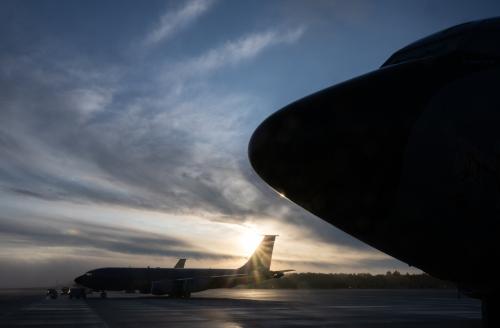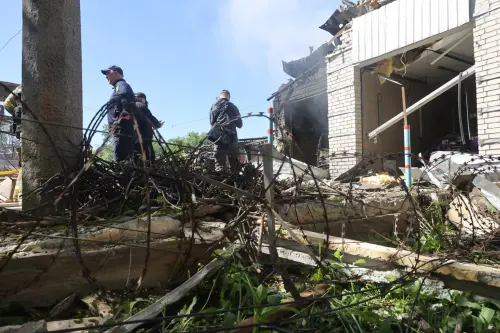LIANE HANSEN: A year ago, the Bush administration was setting the stage for a war in Iraq with claims that Saddam Hussein stockpiled weapons of mass destruction and that his regime posed a threat to the security of the American people. As war neared, the administration anticipated that victorious American troops would be welcomed by liberated Iraqis.
Now a team searching for chemical, biological and nuclear weapons is expected to submit an inconclusive report this coming week, and just yesterday, three rocket-propelled grenades landed on the grounds of the Al-Rasheed Hotel in Baghdad where American soldiers and civilians live. American officials are limited to announcing the seizure of small weapons cache while acknowledging that the number of daily attacks against US forces in the past three months ranged from the low teens to the mid-20s.
Michael O’Hanlon is a senior fellow at The Brookings Institution. He just returned from a Pentagon-sponsored visit to Iraq and he’s in the studio. Welcome back, Michael. What’s it like in Iraq?
MICHAEL O’HANLON: Well, it’s obviously tough. It’s a little better, however, than I thought for a couple of reasons. One is I think the counterinsurgency effort is going fairly well. Now obviously, you mention the number of attacks per day that continue; it’s a real concern. We’re still losing troops. Everyone’s aware of that. The truck bombings in August were tragic. The assassination of the Governing Council member was tragic, but overall, the counterinsurgency mission seems to be going well in that we are taking out a lot more people than we’re losing and I believe we’re using force fairly selectively and carefully on balance. There’s some mistakes here and there. Also, security is pretty good in most of the country despite the fact that it’s not good everywhere and that we certainly hear the reports of violence on a daily basis.
HANSEN: You say it was better than you thought. What were the surprises? Were there any?
O’HANLON: I would say that the main surprise for me was probably that one could travel around the country, even flying over contested areas, with relatively confident sense of security. There wasn’t as much need to avoid certain areas as I might have expected. There is obviously violence. There was violence in some of the regions that we visited on the days we were there. But you’re talking about specific, isolated acts just like you would get in an American city. I’m not trying to say that this is a country at peace, but overall, we really do run most of the country together with our Iraqi partners and the resistance forces are very small pockets who operate only at a given moment here or there.
HANSEN: American officials have claimed that foreign terrorists have entered Iraq. Were you shown any evidence that would substantiate those claims?
O’HANLON: I think it’s compelling. I wasn’t shown evidence directly, but certainly there’s a lot of—we’ve arrested some people from other countries, not as many as I might have thought. And the numbers that are estimated of foreign jihadists are smaller than I had feared. Granted, the estimates could be wrong. It’s always very hard to count people in an insurgency or a counterinsurgency, but it’s probably several hundred to, at most, a couple of thousand from foreign countries. And we’re starting to do fairly well at going after them, or at least limiting their ability to organize.
HANSEN: How are the American troops, who seem to be under daily fire, handling the dual role of being warriors on the one hand and nation-builders on the other?
O’HANLON: Our military is so spectacular at balancing these sorts of things. Whether you like the mission or not, whether you approve of the war or not, you have to admire the troops. And we spent most of our time with them and they just work extremely hard and they’re very professional. They’ve done this throughout the ’90s in the Balkans. We should remember that we’ve learned a lot from those ’90s experiences, that the Bush administration, even though it opposes nation-building in principle, is now benefiting from the fact that we have a military so well-trained in precisely this balance of being warriors at night and then peacekeepers by day. And we’re doing pretty well at the combination, I think.
HANSEN: The Defense Department this past week announced the mobilization of 10,000 soldiers from the Army National Guard. The Bush administration has been trying to get countries—actually, mainly trying to get countries to sign up for peacekeeping responsibilities. Is the contingent, do you think, of the 160,000 American and British troops in and around Iraq sufficient?
O’HANLON: My impression is it’s roughly sufficient. I would probably go a little higher. But the bigger problem is just sustaining that number is going to be very hard, and that’s the reason we have to call up more National Guardsmen. That’s the reason we’re going to have to potentially send Army troops back on a second deployment to Iraq only a few months after they get back from the first one. And troops that I spoke with were worried more about that kind of thing than about the danger to themselves on a daily basis in these patrols.
HANSEN: What did you observe about the lives of, and the quality of life for, ordinary Iraqis? How is the street-level economy working? Any improvement in basic services?
O’HANLON: Well, it’s slow, of course, and that’s a frustrating part of this mission. We’ve got to speed it up. Congress has to support the administration, or at least the bulk of its request for this money. The administration’s late to make the request. We’ve got to catch up here. There’s still way too much unemployment, way too little power. But there are some hopeful signs. For example, up north in Mosul, where the 101st Air Assault Division is based, they’re getting Iraqis involved a lot in reparations of the economy, building up security forces, just getting Iraqis employed and active in various ways.
HANSEN: And what about then, again, more—a little bit about the national economy. Anything worry you about it, impress you?
O’HANLON: Well, certainly, the unemployment rate’s very high. Also, we do have to—Congress does need to scrutinize the $87 billion request. On balance, it’s right, but we are putting a little too much money into American firms going and doing things the big American way. And to some extent, if we put money into the Iraqis’ hands and let them fix things, even imperfectly, it’ll be cheaper; it’ll get more Iraqis involved more quickly.
HANSEN: Final question. Your visit was sponsored by the Defense Department. Are you concerned that you perhaps were given a rather narrow view of the country by your hosts?
O’HANLON: There’s no doubt. But we only had a couple days there. We talked primarily to American officials. However, we could be quite prying and we could really push them. And I think overall, nonetheless, I was reassured. We didn’t meet a lot of Iraqis who could tell us how things were going, but on balance, I think we had some access.
HANSEN: Michael O’Hanlon is a senior fellow at The Brookings Institution. Michael, thanks for coming in.



Commentary
The State of Affairs in Iraq
September 28, 2003